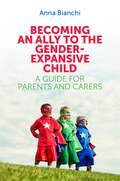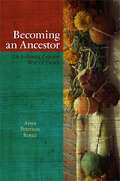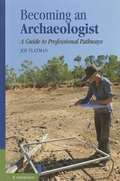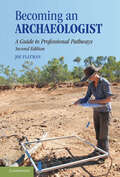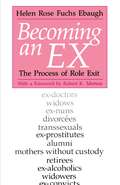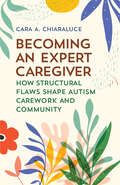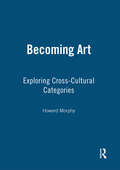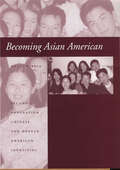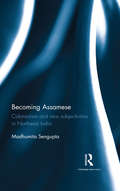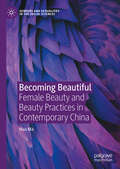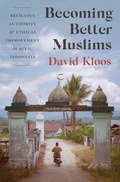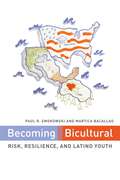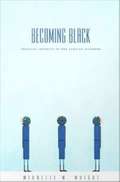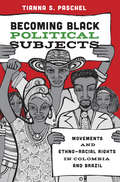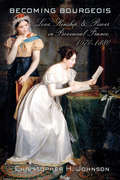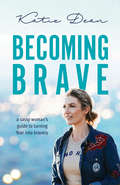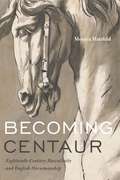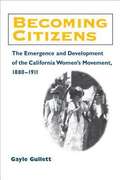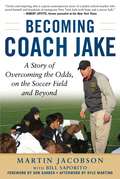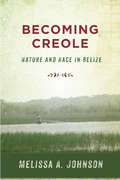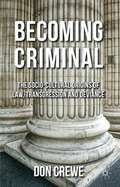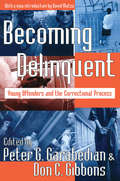- Table View
- List View
Becoming an Ally to the Gender-Expansive Child: A Guide for Parents and Carers
by Anna BianchiWhen Anna Bianchi's grandchild asked, "Nanny, you do know I'm a girl, don't you?", Anna recognised this as a pivotal, and daunting, moment in their relationship. She knew that to answer her grandchild, who had been assigned male at birth, her own attitudes, assumptions and beliefs about gender would need to be examined. With reassuring honesty and openness, Anna draws deeply on four areas: her own experience, current research, interviews with children and their families, and a discussion of power, both in society and between children and adults. She shows how the inner journey of the adult inevitably impacts on the outer journey of the child and, given the significance of this, offers a step-by-step guide to becoming an ally to the gender-expansive child. For anyone eager to understand their child's gender experience, or to learn how best to accept, support and protect them, this book will provide knowledge, reassurance and the confidence to do so.
Becoming an Ancestor: The Isthmus Zapotec Way of Death
by Anya Peterson RoycePowerful and beautifully written, this is the story of the Isthmus Zapotecs of southern Mexico and their unbroken chain of ancestors and collective memory over the generations. Mortuary beliefs and actions are collective and pervasive in ways not seen in the United States, a resonant deep structure across many domains of Zapotec culture.Anthropologist Anya Peterson Royce draws upon forty years of participant research in the city of Juchitán to offer a finely textured portrait of the vibrant and enduring power of death in the Isthmus of Tehuantepec of Mexico. Focusing especially on the lives of Zapotec women, Becoming an Ancestor highlights the aesthetic sensibility and durability of mortuary traditions in the past and present. An intricate blending of Roman Catholicism and indigenous spiritual tradition, death through beliefs and practices expresses a collective solidarity that connects families, binds the living and dead, and blurs the past and present.A model of ethnographic research and presentation, Becoming an Ancestor not only reveals the luminescent heart of Zapotec culture but also provides important clues about the cultural power and potential of mortuary traditions for all societies.
Becoming an Archaeologist
by Joe Flatman"Becoming an Archaeologist: A Guide to Professional Pathways is an engaging handbook on career paths in the area of archaeology. It outlines in straightforward fashion the entire process of getting a job in archaeology, including the various options; the training that is required; and how to get positions in the academic, commercial, and government worlds. It also includes discussion of careers in related heritage professions such as museums and conservation societies. The book includes a series of interviews with real archaeologists, all young professionals who began their careers within the last ten years. These insider guides offer essential tips on how they got their first job and progressed in their careers. Written in an accessible style, the book is essential reading for anyone interested in the realities of archaeology in the 21st century"--
Becoming an Archaeologist: A Guide to Professional Pathways
by Joseph FlatmanBecoming an Archaeologist: A Guide to Professional Pathways is an engaging handbook on career paths in archaeology. It outlines the process of getting a job in archaeology, including various career options, the training required, and how to get positions in the academic, commercial, government and charity sectors. This new edition has been substantially revised and updated. The coverage has been expanded to include many more examples of archaeological lives and livelihoods from dozens of countries around the world. It also has more interviews, with in-depth analyses of the career paths of over twenty different archaeologists working around the world. Data on the demographics of archaeologists has also been updated, as have sections on access to and inclusion in archaeology. The volume also includes revised and updated appendices and a new bibliography. Written in an accessible style, the book is essential reading for anyone interested in a career in archaeology in the twenty-first century.
Becoming an Ex: The Process of Role Exit
by Helen Rose Fuchs EbaughThe experience of becoming an ex is common to most people in modern society. Unlike individuals in earlier cultures who usually spent their entire lives in one marriage, one career, one religion, one geographic locality, people living in today's world tend to move in and out of many roles in the course of a lifetime. During the past decade there has been persistent interest in these "passages" or "turning points," but very little research has dealt with what it means to leave behind a major role or incorporate it into a new identity. Helen Rose Fuchs Ebaugh's pathbreaking inquiry into the phenomenon of becoming an ex reveals the profundity of this basic aspect of establishing an identity in contemporary life. Ebaugh is herself an ex, having left the life of a Catholic nun to become a wife, mother, and professor of sociology. Drawing on interviews with 185 people, Ebaugh explores a wide range of role changes, including ex-convicts, ex-alcoholics, divorced people, mothers without custody of their children, ex-doctors, ex-cops, retirees, ex-nuns, and—perhaps most dramatically—transsexuals. As this diverse sample reveals, Ebaugh focuses on voluntary exits from significant roles. What emerges are common stages of the role exit process—from disillusionment with a particular identity, to searching for alternative roles, to turning points that trigger a final decision to exit, and finally to the creation of an identify as an ex.Becoming an Ex is a challenging and influential study that will be of great interest to sociologists, mental health counselors, members of self-help groups such as Alcoholics Anonymous and Parents Without Partners, those in corporate settings where turnover has widespread implications for the organization, and for anyone struggling through a role exit who is trying to establish a new sense of self.
Becoming an EX: The Process of Role Exit
by Helen Rose Fuchs EbaughThe experience of becoming an ex is common to most people in modern society. Unlike individuals in earlier cultures who usually spent their entire lives in one marriage, one career, one religion, one geographic locality, people living in today's world tend to move in and out of many roles in the course of a lifetime. During the past decade there has been persistent interest in these "passages" or "turning points," but very little research has dealt with what it means to leave behind a major role or incorporate it into a new identity. Helen Rose Fuchs Ebaugh's pathbreaking inquiry into the phenomenon of becoming an ex reveals the profundity of this basic aspect of establishing an identity in contemporary life. Ebaugh is herself an ex, having left the life of a Catholic nun to become a wife, mother, and professor of sociology. Drawing on interviews with 185 people, Ebaugh explores a wide range of role changes, including ex-convicts, ex-alcoholics, divorced people, mothers without custody of their children, ex-doctors, ex-cops, retirees, ex-nuns, and—perhaps most dramatically—transsexuals. As this diverse sample reveals, Ebaugh focuses on voluntary exits from significant roles. What emerges are common stages of the role exit process—from disillusionment with a particular identity, to searching for alternative roles, to turning points that trigger a final decision to exit, and finally to the creation of an identify as an ex. Becoming an Ex is a challenging and influential study that will be of great interest to sociologists, mental health counselors, members of self-help groups such as Alcoholics Anonymous and Parents Without Partners, those in corporate settings where turnover has widespread implications for the organization, and for anyone struggling through a role exit who is trying to establish a new sense of self.
Becoming an Expert Caregiver: How Structural Flaws Shape Autism Carework and Community (Carework in a Changing World)
by Cara A. Chiaraluce“The hardest thing is dealing with the rest of the world. And we kind of accommodate our lives around that. But the rest of the world doesn’t.” These poignant words were spoken by Charlotte, a mother and primary caregiver of a five-year-old autistic boy, and her words reference the structural arrangements of our world that shape autism carework today. This book features the voices of fifty primary caregivers of autistic and neurodivergent children who illuminate the process through which laywomen become expert caregivers to provide the best care for their children. Expert caregiving captures an intensification of traditional family carework – meeting dependents’ financial, emotional, and physical needs – that transcends the walls of one’s private home and family and challenges the strict boundaries between many worlds: lay and professional, family and work, private and public, medical and social, and individual and society. The process of becoming an expert caregiver spotlights several interesting paradoxes in sociological literature, particularly regarding gender, family, and medicalization, and often forgotten structural flaws in “the rest of the world.” Throughout the chapters in this book, the expert caregiver is one person who faces unbelievably daunting tasks of filling or reforming persistent institutional gaps, primarily in education and health care, and subverting ableist cultural norms. Without institutional support, answers to their questions, or pragmatic avenues to access resources, lay caregivers become the experts. Their trials and tribulations, especially when navigating the boundaries of professional/lay and private/public worlds, illuminate a type of carework that is increasingly relevant to a growing number of young families caring for neurodivergent, disabled, medically fragile, and/or chronically ill children. These stories offer a vivid picture of the often invisible complex challenges and structural forces that drive individuals to become expert caregivers in the first place.
Becoming Art: Exploring Cross-Cultural Categories
by Howard MorphyThirty years ago Australian Aboriginal art was little more than a footnote to world art. Today, it is considered to be an important contemporary art movement, often promoted as being connected to a deep cultural past. Becoming Art provides a new analysis of the shifting cultural and social contexts that surround the production of Aboriginal art. Transcending the boundaries between anthropology and art history, the book draws on arguments from both disciplines to provide a unique interdisciplinary perspective that places the artists themselves at the centre of the argument.Western art history has traditionally regarded Aboriginal art as distanced from time and place. Becoming Art uses the recent history of Aboriginal art to challenge some of the presuppositions of western art discourse and western art worlds. It argues for a more cross-cultural perspective on world art history.
Becoming Asian American: Second-Generation Chinese and Korean American Identities
by Nazli KibriaIn Becoming Asian American, Nazli Kibria draws upon extensive interviews she conducted with second-generation Chinese and Korean Americans in Boston and Los Angeles who came of age during the 1980s and 1990s to explore the dynamics of race, identity, and adaptation within these communities. Moving beyond the frameworks created to study other racial minorities and ethnic whites, she examines the various strategies used by members of this group to define themselves as both Asian and American.In her discussions on such topics as childhood, interaction with non-Asian Americans, college, work, and the problems of intermarriage and child-raising, Kibria finds wide discrepancies between the experiences of Asian Americans and those described in studies of other ethnic groups. While these differences help to explain the unusually successful degree of social integration and acceptance into mainstream American society enjoyed by this "model minority," it is an achievement that Kibria's interviewees admit they can never take for granted. Instead, they report that maintaining this acceptance "requires constant effort on their part." Kibria suggests further developments may resolve this situation—especially the emergence of a new kind of pan–Asian American identity that would complement the Chinese or Korean American identity rather than replace it.
Becoming Asian American: Second-Generation Chinese and Korean American Identities
by Nazli KibriaBased on interviews with second-generation Chinese- and Korean-Americans, “this book is filled with a number of illuminating empirical findings” (American Journal of Sociology).In Becoming Asian American, Nazli Kibria draws upon extensive interviews she conducted with second-generation Chinese and Korean Americans in Boston and Los Angeles who came of age during the 1980s and 1990s to explore the dynamics of race, identity, and adaptation within these communities. Moving beyond the frameworks created to study other racial minorities and ethnic whites, she examines the various strategies used by members of this group to define themselves as both Asian and American.In her discussions on such topics as childhood, interaction with non-Asian Americans, college, work, and the problems of intermarriage and child-raising, Kibria finds wide discrepancies between the experiences of Asian Americans and those described in studies of other ethnic groups. While these differences help to explain the unusually successful degree of social integration and acceptance into mainstream American society enjoyed by this “model minority,” it is an achievement that Kibria’s interviewees admit they can never take for granted. Instead, they report that maintaining this acceptance requires constant effort on their part. Kibria suggests further developments may resolve this situation—especially the emergence of a new kind of pan–Asian American identity that would complement the Chinese or Korean American identity rather than replace it.
Becoming Assamese: Colonialism and New Subjectivities in Northeast India
by Madhumita SenguptaThis book explores the making of colonial Northeast India and offers a new perspective to the study of the Assamese identity in the nineteenth century as a distinctly nineteenth-century cultural phenomenon, not confined to linguistic parameters alone. It studies crucial markers of the self — history, customs, food, dress, new religious beliefs — and symbols considered desirable by the provincial middle class and the way these fitted in with the latter’s nationalist subjectivities in the face of an emphatic Bengali cultural nationalism. The author shows how colonialism was intrinsically linked to the assertion of middle class intelligentsia in the region and was instrumental in eroding the essential malleability of societal processes nurtured by the Ahom state. Rich with fresh research data, this book will be useful to scholars and researchers of history, political science, area studies, and to anyone interested in understanding Northeast India.
Becoming Beautiful: Female Beauty and Beauty Practices in Contemporary China (Genders and Sexualities in the Social Sciences)
by Hua MaThis book explores young women’s negotiations of female beauty and beauty practices in contemporary China, based on 20 semi-structured interviews, 10 beauty diaries, and 10 follow-up interviews with women aged 18–25. The research takes an interdisciplinary feminist approach to explore several themes related to beauty, including reasons for engaging in beauty practices, daily beauty routines and their understanding of what constitutes female beauty. Focusing on the under-researched everyday beauty practices in Chinese culture, the book addresses gaps in feminist work on beauty, particularly by examining postfeminism in China. It reveals how young Chinese women use postfeminist discourse of choice and pleasure to explain their beauty practices, while also negotiating inner and outer beauty within a Chinese social and political context. This study highlights how local values and postfeminism shape attitudes toward beauty. This book also foregrounds the issues of cultural specificity within beauty culture studies. Combining rich empirical data with feminist analysis, this work appeals to students and scholars of sociology, women’s and gender studies, feminist theory, media and cultural studies, and Chinese and East Asian studies.
Becoming Better Muslims: Religious Authority and Ethical Improvement in Aceh, Indonesia
by David KloosHow do ordinary Muslims deal with and influence the increasingly pervasive Islamic norms set by institutions of the state and religion? Becoming Better Muslims offers an innovative account of the dynamic interactions between individual Muslims, religious authorities, and the state in Aceh, Indonesia. Relying on extensive historical and ethnographic research, David Kloos offers a detailed analysis of religious life in Aceh and an investigation into today’s personal processes of ethical formation.Aceh is known for its history of rebellion and its recent implementation of Islamic law. Debunking the stereotypical image of the Acehnese as inherently pious or fanatical, Kloos shows how Acehnese Muslims reflect consciously on their faith and often frame their religious lives in terms of gradual ethical improvement. Revealing that most Muslims view their lives through the prism of uncertainty, doubt, and imperfection, he argues that these senses of failure contribute strongly to how individuals try to become better Muslims. He also demonstrates that while religious authorities have encroached on believers and local communities, constraining them in their beliefs and practices, the same process has enabled ordinary Muslims to reflect on moral choices and dilemmas, and to shape the ways religious norms are enforced.Arguing that Islamic norms are carried out through daily negotiations and contestations rather than blind conformity, Becoming Better Muslims examines how ordinary people develop and exercise their religious agency.
Becoming Bicultural: Risk, Resilience, and Latino Youth
by Paul R. Smokowski Martica BacallaoAlthough the United States has always been a nation of immigrants, the recent demographic shifts resulting in burgeoning young Latino and Asian populations have literally changed the face of the nation. This wave of massive immigration has led to a nationwide struggle with the need to become bicultural, a difficult and sometimes painful process of navigating between ethnic cultures.While some Latino adolescents become alienated and turn to antisocial behavior and substance use, others go on to excel in school, have successful careers, and build healthy families. Drawing on both quantitative and qualitative data ranging from surveys to extensive interviews with immigrant families, Becoming Bicultural explores the individual psychology, family dynamics, and societal messages behind bicultural development and sheds light on the factors that lead to positive or negative consequences for immigrant youth. Paul R. Smokowski and Martica Bacallao illuminate how immigrant families, and American communities in general, become bicultural and use their bicultural skills to succeed in their new surroundings The volume concludes by offering a model for intervention with immigrant teens and their families which enhances their bicultural skills.
Becoming Black: Creating Identity in the African Diaspora
by Michelle M. WrightBecoming Black is a powerful theorization of Black subjectivity throughout the African diaspora. In this unique comparative study, Michelle M. Wright discusses the commonalties and differences in how Black writers and thinkers from the United States, the Caribbean, Africa, France, Great Britain, and Germany have responded to white European and American claims about Black consciousness. As Wright traces more than a century of debate on Black subjectivity between intellectuals of African descent and white philosophers, she also highlights how feminist writers have challenged patriarchal theories of Black identity. Wright argues that three nineteenth-century American and European works addressing race--Thomas Jefferson's Notes on the State of Virginia, G. W. F. Hegel's Philosophy of History, and Count Arthur de Gobineau's Essay on the Inequality of the Human Races--were particularly influential in shaping twentieth-century ideas about Black subjectivity. She considers these treatises in depth and describes how the revolutionary Black thinkers W. E. B. Du Bois, Aim Csaire, Lopold Sdar Senghor, and Frantz Fanon countered the theories they promulgated. She explains that while Du Bois, Csaire, Senghor, and Fanon rejected the racist ideologies of Jefferson, Hegel, and Gobineau, for the most part they did so within what remained a nationalist, patriarchal framework. Such persistent nationalist and sexist ideologies were later subverted, Wright shows, in the work of Black women writers including Carolyn Rodgers and Audre Lorde and, more recently, the British novelists Joan Riley, Naomi King, Jo Hodges, and Andrea Levy. By considering diasporic writing ranging from Du Bois to Lorde to the contemporary African novelists Simon Njami and Daniel Biyaoula, Wright reveals Black subjectivity as rich, varied, and always evolving.
Becoming Black Political Subjects: Movements and Ethno-Racial Rights in Colombia and Brazil
by Tianna S. PaschelAfter decades of denying racism and underplaying cultural diversity, Latin American states began adopting transformative ethno-racial legislation in the late 1980s. In addition to symbolic recognition of indigenous peoples and black populations, governments in the region created a more pluralistic model of citizenship and made significant reforms in the areas of land, health, education, and development policy. Becoming Black Political Subjects explores this shift from color blindness to ethno-racial legislation in two of the most important cases in the region: Colombia and Brazil. Drawing on archival and ethnographic research, Tianna Paschel shows how, over a short period, black movements and their claims went from being marginalized to become institutionalized into the law, state bureaucracies, and mainstream politics. The strategic actions of a small group of black activists--working in the context of domestic unrest and the international community's growing interest in ethno-racial issues--successfully brought about change. Paschel also examines the consequences of these reforms, including the institutionalization of certain ideas of blackness, the reconfiguration of black movement organizations, and the unmaking of black rights in the face of reactionary movements. Becoming Black Political Subjects offers important insights into the changing landscape of race and Latin American politics and provokes readers to adopt a more transnational and flexible understanding of social movements.
Becoming Bourgeois: Love, Kinship, and Power in Provincial France, 1670–1880
by Christopher H. JohnsonBecoming Bourgeois traces the fortunes of three French families in the municipality of Vannes, in Brittany—Galles, Jollivet, and Le Ridant—who rose to prominence in publishing, law, the military, public administration, and intellectual pursuits over the course of the eighteenth and nineteenth centuries. Revisiting complex issues of bourgeois class formation from the perspective of the interior lives of families, Christopher H. Johnson argues that the most durable and socially advantageous links forging bourgeois ascent were those of kinship. Economic success, though certainly derived from the virtues of hard work and intelligent management, was always underpinned by marriage strategies and the diligent intervention of influential family members. Johnson's examination of hundreds of personal letters opens up a whole world: the vicissitudes of courtship; the centrality of marriage; the depths of conjugal love; the routines of pregnancy and the drama of childbirth; the practices of child rearing and education; the powerful place of siblings; the role of kin in advancing the next generation; tragedy and deaths; the enormous contributions of women in all aspects of becoming bourgeois; and the pleasures of gathering together in intimate soirées, grand balls, country houses, and civic and political organizations. Family love bound it all together, and this is ultimately what this book is about, as four generations of rather ordinary provincial people capture our hearts.
Becoming Brave: A sassy woman’s guide to turning fear into bravery
by Katie DeanIn this motivating, powerful and incredibly relatable book, Katie Dean provides the practical tools to nudge you out of your comfort zone, befriend your fear and let go of the feelings that were never yours to carry. Becoming Brave puts you back in the driver’s seat of your life and encourages a life lived on your terms, filled with confidence, the occasional cuss word and the ability to turn things around when the chips are down.Becoming Brave is an honest snapshot into a world where it’s possible to thrive with Anxiety.A book that encourages the courageousness to be both brave and vulnerable and celebrates sensitivity as a superpower.Katie Dean is the founder of YOUR WILD LIFE and not your typical motivational coach or a typical anything. She’s written Becoming Brave for other women like her: sassy women pursuing a path to creativity, spirituality and a life-loved even when that path is wildly messy.
Becoming Centaur: Eighteenth-Century Masculinity and English Horsemanship (Animalibus: Of Animals and Cultures #9)
by Monica MattfeldIn this study of the relationship between men and their horses in seventeenth- and eighteenth-century England, Monica Mattfeld explores the experience of horsemanship and how it defined one’s gendered and political positions within society.Men of the period used horses to transform themselves, via the image of the centaur, into something other—something powerful, awe-inspiring, and mythical. Focusing on the manuals, memoirs, satires, images, and ephemera produced by some of the period’s most influential equestrians, Mattfeld examines how the concepts and practices of horse husbandry evolved in relation to social, cultural, and political life. She looks closely at the role of horses in the world of Thomas Hobbes and William Cavendish; the changes in human social behavior and horse handling ushered in by elite riding houses such as Angelo’s Academy and Mr. Carter’s; and the public perception of equestrian endeavors, from performances at places such as Astley’s Amphitheatre to the satire of Henry William Bunbury. Throughout, Mattfeld shows how horses aided the performance of idealized masculinity among communities of riders, in turn influencing how men were perceived in regard to status, reputation, and gender.Drawing on human-animal studies, gender studies, and historical studies, Becoming Centaur offers a new account of masculinity that reaches beyond anthropocentrism to consider the role of animals in shaping man.
Becoming Centaur: Eighteenth-Century Masculinity and English Horsemanship (Animalibus)
by Monica MattfeldIn this study of the relationship between men and their horses in seventeenth- and eighteenth-century England, Monica Mattfeld explores the experience of horsemanship and how it defined one’s gendered and political positions within society.Men of the period used horses to transform themselves, via the image of the centaur, into something other—something powerful, awe-inspiring, and mythical. Focusing on the manuals, memoirs, satires, images, and ephemera produced by some of the period’s most influential equestrians, Mattfeld examines how the concepts and practices of horse husbandry evolved in relation to social, cultural, and political life. She looks closely at the role of horses in the world of Thomas Hobbes and William Cavendish; the changes in human social behavior and horse handling ushered in by elite riding houses such as Angelo’s Academy and Mr. Carter’s; and the public perception of equestrian endeavors, from performances at places such as Astley’s Amphitheatre to the satire of Henry William Bunbury. Throughout, Mattfeld shows how horses aided the performance of idealized masculinity among communities of riders, in turn influencing how men were perceived in regard to status, reputation, and gender.Drawing on human-animal studies, gender studies, and historical studies, Becoming Centaur offers a new account of masculinity that reaches beyond anthropocentrism to consider the role of animals in shaping man.
Becoming Citizens: The Emergence and Development of the California Women's Movement, 1880-1911
by Gayle GullettIn 1880, the California woman safeguarded the Republic by maintaining a morally sound home. Scarcely forty years later, women in the Pacific state won full-fledged citizenship and voting rights of their own. Becoming Citizens shows how this enormous transformation came about. Gayle Gullett demonstrates how women's search for a larger public life in the late nineteenth century led to a flourishing women's movement in California. Women's radical demand for citizenship, however, was rejected by state voters along with the presidential reform candidate, William Jennings Bryan, in the tumultuous election year of 1896. Gullett shows how women rebuilt the movement in the early years of the twentieth century and forged a critical alliance between activist women and the men involved in the urban Good Government movement. This alliance formed the basis of progressivism, with male Progressives helping to legitimize women's new public work by supporting their civic campaigns, appointing women to public office, and placing a suffrage referendum before the male electorate in 1911. Placing local developments in a national context, Becoming Citizens illuminates the links between these two major social movements: the western women's suffrage movement and progressivism.
Becoming Coach Jake: A Story of Overcoming the Odds, on the Soccer Field and Beyond
by Martin Jacobson Bill SaporitoA memoir about battling adversity, by the winningest high school soccer coach in New York City public school history! In the Fall of 2018, Martin Luther King Jr. High School’s boys soccer program won its 18th New York City public school championship to culminate a 19–0 season in which it was ranked no. 3 in the country. Martin Jacobson, whose first championship team was in 1996, three years after he became head coach, had put together yet another winning squad, continuing to make history in the process. But Coach Jake’s story is more than just a soccer tale. In his time as coach at MLK, he has given hundreds of immigrants—from places like Mexico, Columbia, Senegal, Mali, and Haiti, and some of them homeless or parentless—an opportunity to gain some direction in both the classroom as well as on the field. Becoming Coach Jake highlights some of those individuals’ stories and brings to light how, with Jake’s guidance, many of them have gone on to achieve great success in their adult lives. Along the way, readers learn how Coach Jake got to MLK after a drug-filled past that included multiple failed marriages and near-prison sentences, before quitting drugs and alcohol cold turkey in 1985 after several stints in rehab proved unsuccessful. Jacobson teams up with seasoned journalist Bill Saporito to detail the triumph achieved both on the field and far beyond.
Becoming Creole: Nature and Race in Belize (Critical Caribbean Studies)
by Melissa A. JohnsonBecoming Creole explores how people become who they are through their relationships with the natural world, and it shows how those relationships are also always embedded in processes of racialization that create blackness, brownness, and whiteness. Taking the reader into the lived experience of Afro-Caribbean people who call the watery lowlands of Belize home, Melissa A. Johnson traces Belizean Creole peoples’ relationships with the plants, animals, water, and soils around them, and analyzes how these relationships intersect with transnational racial assemblages. She provides a sustained analysis of how processes of racialization are always present in the entanglements between people and the non-human worlds in which they live.
Becoming Criminal
by Don CreweThis book consists of a fundamental deconstruction and reconstruction of the key concepts of Criminology and The Sociology of Law, providing a coherent expression of the relationships between these newly constructed concepts and thus a radically new statement of the relationship between society, crime and the law.
Becoming Delinquent: Young Offenders and the Correctional Process
by Peter G. Garabedian Don C. GibbonsThis book addresses the social experiences of juvenile offenders in the correctional machinery and the career effects these experiences have on offenders. It follows offenders from apprehension through detention, court appearance, probation and institutionalization, showing how the organizations operate, the role definitions of the people who man them, and the views of the correctional organizations held by members of the public. It is a valuable supplement to courses in deviance, criminology, social problems and organizational analysis. The book begins with the delinquent population and endeavours to identify the major characteristics of juvenile lawbreaking. It separates youths who most often remain as "hidden" delinquents from those who are observed and apprehended. The text then moves through the major parts of the correctional machinery in much the same way as offenders are processed through it. Information on each topic is marshalled in accordance with five dimensions; the nature of the organization; the perspectives of the consumer (the public); the perspective of the employees; the perspectives of the offenders; and the impact of the agency upon offenders. Thus, a major focus of the book is an organizational analysis, a basic feature of the current sociological perspective. This work, on first publication in 1970, was one of the first to tackle the growing skepticism as to the beneficial aspects correctional institutions may have on the young offenders, and the analysis of those benefits. The readings attempt to show something of the impact of correctional experiences on juvenile delinquents, and suggest that the overall effect is to drive deviants further into deviant activities rather than attaining the desired goal of rehabilitation.
